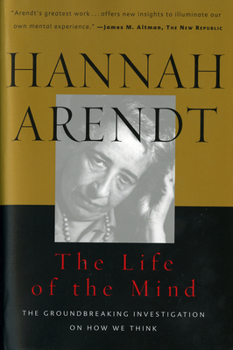Life of the Mind: One/Thinking, Two/Willing
Select Format
Select Condition 
Book Overview
The most intriguing...and thought-provoking book that Hannah Arendt wrote (The New York Times Book Review), The Life of the Mind is the final work by the political theorist, philosopher, and feminist thinker.This fascinating book investigates thought itself as it exists in contemplative life. In a shift from Arendt's previous writings, most of which focus on the world outside the mind, this is an exploration of the mind's activities she considered...
Format:Paperback
Language:English
ISBN:0156519925
ISBN13:9780156519922
Release Date:March 1981
Publisher:Mariner Books Classics
Length:521 Pages
Weight:1.06 lbs.
Dimensions:1.2" x 5.3" x 8.0"
Customer Reviews
2 ratings
A refuge of delight for the thoughtful reader
Published by Thriftbooks.com User , 16 years ago
I came to this book still quite skeptical of Arendt's writing style and intellectual caliber; several years earlier I had attempted to read her book 'The Human Condition' and it underwhelmed me with its stilted writing style. But I was pleasantly surprised and even delighted almost from the first few pages of this work. This book was a complete intellectual delight, relatively easy to digest, but extremely well written, without a trace of arrogance or stylistic awkwardness. This is no doubt due to the expert assistance given Arendt by her editor Mary McCarthy. While Arendt had originally planned to write a three-part work, on Thinking, Willing, and Judging, she only lived to complete the first two sections. But since she associates Thinking with the past and Willing with the future, it seems fitting to limit the book to these two concepts. (There is a short appendix containing lecture notes from a series she had given on Kant's Critique of Judgment, but I don't recommend it; it's very rough and hard to read.) A large part of the first section on Thinking is devoted to Greek philosophy. She throws around a fair amount of Greek that, for the most part, is translated or understandable from the context. The second section is heavy on medieval philosophy with healthy doses of Latin all over the place. This was the more interesting section from my point of view, for there are lengthy discussions of Augustine and Duns Scotus. Towards the end of the second section she deals with Nietzsche and Heidegger. Heidegger (as you might expect) is given a full and sympathetic treatment. Reading this book has been an experience that I won't soon forget. In fact, I am suffering withdrawal symptoms from it as I write this review. The book was a one-of-a-kind intellectual home to me. I will also add, once you get to the end of the Willing section, you may as well stop reading. Editor Mary McCarthy's Postface is rather self-centered and repetitious, not really worth one's time. And the final unedited lectures of Arendt on Kant's Critique of Judgment are rough, sketchy, and very unlike the polished prose of the earlier part of this great book. If you are looking for a sophisticated work that will engage your mind but will not overwhelm your intellect, then this is the book. It will easily become a refuge of delight for any thoughtful reader.
Incredible.
Published by Thriftbooks.com User , 24 years ago
This book does so much in such a small space. It is at once an introduction to much of Western philosophy and an original treatise on many fundamental philosophical questions. Like her other books, Arendt focuses here more on philosophy as it applies to a person rather than more theoretical matters such as metaphysics. Everybody should read this book. I had it for a sophomore-level philosophy class, and I have found myself coming back to it time and time again for the next 8 years.





